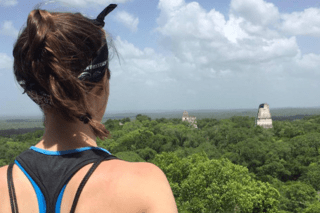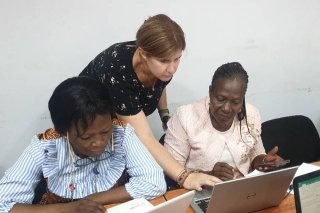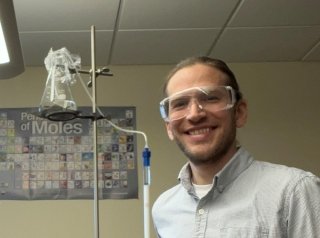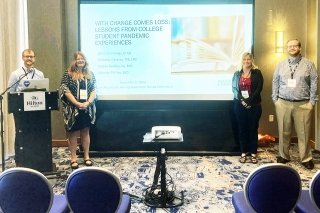An anthropological path to academic success
Posted:

The prize “fossils” that Emily Haney brought home with gritty, dirty hands when she was a child do not compare to the fragile, priceless treasures that she carefully cupped in her hands while in the steamy jungles of Guatemala.
During the summers of her undergrad career at Bloomsburg University she excavated ceramic vessels from elite households in the ancient Maya city of El Peru-Waka’. Analyzing those artifacts in the lab in Guatemala City culminated in the anthropological dreams of a university research student.
The faculty in the anthropology department, especially Damien Marken, Ph.D. played a large part in this successful BU experience. Haney’s appearance on the dean’s list throughout her academic years enabled eligibility for honors and awards that propelled her forward into her graduate program at Brandeis University in Massachusetts. Being a member of BU’s Honor Society of Phi Kappa Phi, selected as an intern for the Harrisburg Internship Semester (THIS) and as a BU nominee for the Ali-Zaidi Award of Academic Excellence was not enough. Haney went on to be named the recipient of the prestigious Lambda Alpha National Anthropology Honor Society Scholarship Award.
What started in small grants as funding for the research project in Guatemala, soon blossomed into the support of the above-mentioned awards. Bloomsburg University added to her professional career as a student researcher in Guatemala by awarding Haney an Undergraduate Research Scholarship and Creative Activities Award (URSCA).
“Although field work is tough and living in the jungle can be intimidating at times, being a part of an excavation is an unparalleled experience that makes all the hardships seem trivial.” Yet her time in the field has contributed to skills vital to archaeological excavations. It is easy to envision the shine in her eyes when she speaks of the grinding work, “I aided in the excavations of an elite residential complex known as the Chok group,” said Haney.
While in the lab, she also analyzed and reconstructed a cache of funerary vessels from the excavations. Working with the artifacts gave Haney a “surreal connection, to think that when I place my thumb in a decorative indentation on a ceramic vessel, the indentation was once occupied by a thumb of an ancient Maya potter, or when I hold a polychrome vessel, it may have once been used by royalty.”
All of that digging in the dirt, from childhood to present has culminated in many research projects where she has disseminated her findings at national conferences including the Society for American Archaeology (SAA), and the Society for Applied Anthropology (SfAA). Her accrued research through the Waka’ Archaeological Project has gained her material for posters, and presentations, not to mention co-authorships on governmental reports concerning “the documentation of social differences across the residential portions of the ancient Maya city,” said Haney.
Haney aspires to an M.A. in museum anthropology and eventually a doctorate in anthropology/archaeology to fulfill her dream of “teaching at a college level, as well as work as a museum curator,” said Haney. The education she received at Bloomsburg University was not all academic. Being a shy person meant not having the confidence to “put herself out there and really go for things,” she says. What she acquired from the support of her professors and the experiences at BU helped her “gain confidence in both myself and my abilities as an aspiring anthropologist.”
Exiting as a well-rounded undergrad of BU through excellent academics and life experiences has created a grand entrance into the professional world. Haney has the ability to achieve her dream of being an “archaeologist who conducts field and lab research, inspire the next generation of anthropologists through teaching, and is able to connect with the public through museum curation.”



